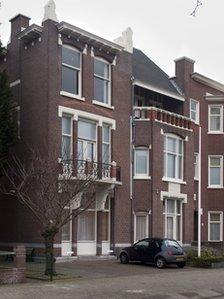Dutch offered 'euthanasia on wheels'
- Published

The NVVE has its office in Amsterdam
Euthanasia has been legal in the Netherlands for a decade. But an organisation based in The Hague is now offering a mobile euthanasia service, prompting accusations that the law has been pushed too far.
The anti-euthanasia lobby is in a fury, branding the mobile euthanasia units "death squads" and accusing the government of not doing enough to enforce the strict medical codes of practice that accompanies the procedure.
Teams will be travelling around the country assisting patients whose own doctors refuse to help them to die. The new units consist of a doctor, a nurse and all the medical equipment required to carry out euthanasia.
Patients can choose injections administered by the medical team, or they may drink a lethal concoction of life-ending drugs.
The Dutch right-to-die organisation (NVVE), which is funding the new scheme, says both options will be available on the mobile units.
"They will first give the patient an injection, which will put them into a deep sleep, then a second injection follows, which will stop their breathing and heart beat," says the group's Walburg de Jong.
One of the creators of the Levenseinde (Life End) units, Jan Suyver, strongly believes that patients should have the right to decide to die.
"If you are so ill and you know it is not going to get better then at least you can choose to die surrounded by your family, you can choose to 'die consciously' so you know what's happening and you are in control," he says.
'Unbearable pain'
Mr Suyver, a retired judge, says he was inspired to take action after seeing many people who met the strict criteria for euthanasia but were rejected by their own GPs.
"I saw patients experiencing unbearable pain who had no chance of recovery, and who were certain that they wanted to die, but because their own doctors felt they were not experienced enough to perform euthanasia, or because they felt like it went against their religious or moral beliefs, they would not do it," he says.
"So then what happens to the patient? Euthanasia is legal under Dutch law so if someone wants this and they meet all the requirements they are be entitled to this and that is why I made the units - for those patients."
In 2002, the Netherlands became the first country in the world to legalise euthanasia. Every year there are between 2,500 and 3,000 procedures carried out, accounting for about 2% of deaths annually.
Belgium also legalised euthanasia in 2002, and assisted suicide has been allowed in Switzerland since the 1940s. In the UK there have been discussions about changing the law for many years, and a recent report published by the Commission on Assisted Dying, funded by campaigners who want to see a change in the law, recommended the legalisation of euthanasia in the UK.
The legal guidelines in the Netherlands state that patients must be fully conscious when requesting euthanasia. Two doctors must agree that there is no chance of recovery and that the patient is experiencing "unbearable and interminable suffering".
'Crazy idea'
But Bert Dorenbos who represents the Dutch Cry for Life campaign group thinks mobile units push the limits of the legislation too far.
"It's a crazy idea. It's an excuse for pro-euthanasia people to push their agenda. I think it's a PR campaign more than caring for patients who are suffering.
"'Come to our clinic and we will help you die.' They make it sound so easy and simple and it should not be that way."
Mr Suyver says he is aware that the service could be open to abuse.
"Of course I'm sure there will be people who just want to commit suicide and think we will help them. We will not. Those applications will be rejected," he says.
What makes this scheme even more controversial is that the Royal Dutch Medical Association has raised concerns that the remote nature of the mobile units will not allow the doctors to develop a strong enough relationship with the patient to be able to decide if they are eligible for euthanasia.
"The patient needs someone to talk to, not just a legal assessment," says Gert van Dijk, a medical ethics expert.
"It's more that just assessing whether criteria for euthanasia has been met. A normal doctor might be able to offer other solutions, better pain relief perhaps, the euthanasia doctor doesn't do that."
The Hague-based facility that will dispatch the mobile euthanasia units does not yet have any bookings. In fact, it does not even have any beds. There is just a woman answering a telephone.
Eventually they expect to deal with about 1,000 cases a year, and say they will not charge the patients.
Initially the organisation itself will cover the costs, although they're currently in discussions with insurance companies to try and reach an agreement that will allow the mobile euthanasia unit service to be available through Dutch medical insurance.